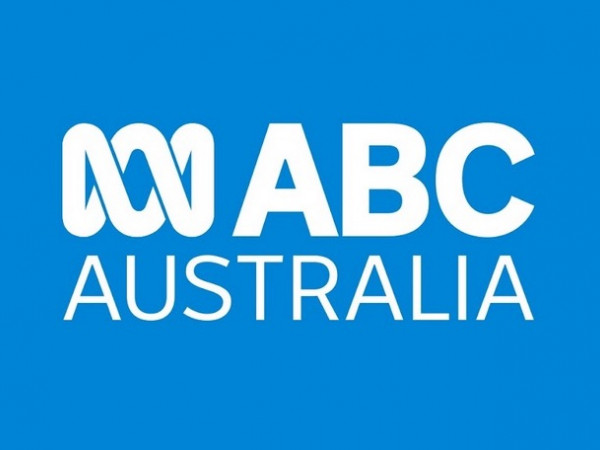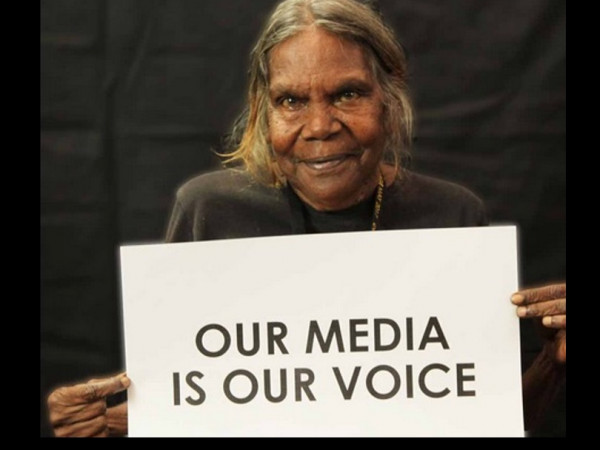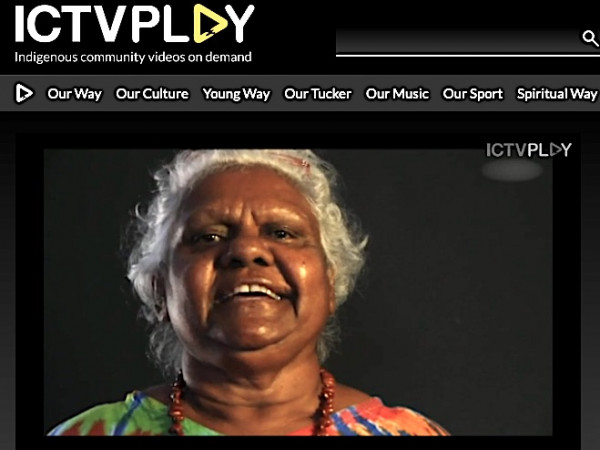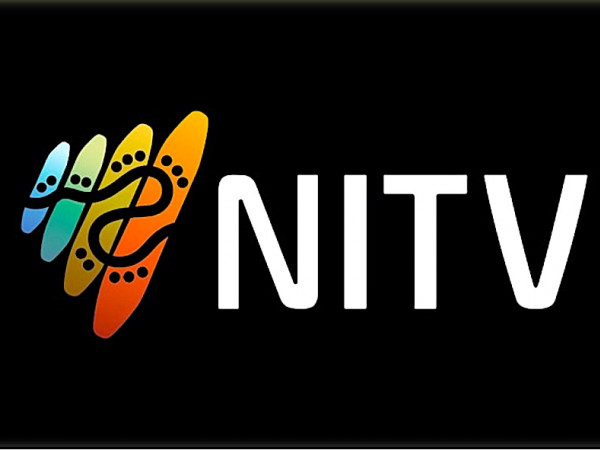Tanya Denning-Orman
“We’re in control of our narrative…”
Satellite Dreaming was pretty much part of my university degree and education. I, when I was at university, I was aiming to just be a foreign correspondent and go into media. Quite interesting… there was the document called The Aboriginal Invention of Television, a white paper and a recommended viewing was Satellite Dreaming. That was when I was at university. I was aiming to, you know, go and see the world. And it's quite interesting seeing my path and career now, where I've ended up. So Satellite Dreaming was very much, definitely a part of my foundation in the sense it gave me a bit more of an insight of the world that I was about to enter.
My feelings with it, you know, number one is that it was created by a non-indigenous person. So straightaway you can see with the lens of where the opinion and how the framing, which I think is really important, piece of factual documentation for its period. And that's the way I always look at credits, especially when there are credits in regards to indigenous content. And I know the creator, Ivo Burum. He worked on a lot of early programmes at NITV - great guy, created a great lot of work with community media. However, there is definitely, you can call it immediately the perspective…
And I do wonder what Satellite Dreaming would have been like if it was created by non-indigenous, an indigenous person, because the lens and how we're placed in the documentary, it would be different. So we're not otherising, we're not talking about indigenous people in a certain way. We're talking about the story and the experience and the observations from our perspective.
What really stands out for me in Satellite Dreaming is this, when I think it was over at, no, it wasn't First In Line, it wasn't Rhoda Roberts - it was definitely over at the ABC when they were talking about ‘Well they have to create the content and the executives, and make it appealing for a non-indigenous audience’. And that has always stood out for me, because a good story, is a good story, is a good story. And it really also showed our place in the world as ours, as indigenous people - and then how executives and the media machinery devalued culture and devalued great stories and what the world we had to work in, and the fact that you had these amazing storytellers working at the ABC, or working at SBS, and how they had to make it appealing to, first of all, the executives in order to for them… their feeling was making it appealing for executives, made it appealing for wider Australian audience. And that's really an example of the time that we were in…
We've been strangers in our own land and … the fact that we haven't seen ourselves on Australian television, but also then when television was talking about us, it was really damaging or it was negative. And that's why we needed to get our own indigenous service available to every Australian.
…I grew up as an 80s kid in central Queensland. You know, my family from North Queensland, Guugu Yimidhirr Birri, but which is north Queensland around Cooktown and then Birri Gubba is around the Whitsundays. So, a good stretch of Queensland. But I actually grew up in a railway and mining town. And I think the little box in the room back then was the window to the world. And there was a lot of …well, a lack of my world seen on that box, of what was seen of the world I was growing up in, was very negative - until one day I actually saw this beautiful black Aboriginal woman reading the local commercial news. So, we had two channels, ABC and RTQ7. And this woman was reading the news.
So that sparked me to seeing what I could potentially be - has had …that influential moment where I could see this idea of ‘I could potentially be that’. And in the midst of the beige of what Australian TV is or was, that really triggered me to get… so I worked hard, I got to uni and kept on knocking on the door of ABC while I was studying and finished my degree in three years. And ABC still wouldn't let me in. And so I started working for them for free and ended up at Triple J [ABC Radio station] and just sort of, you know, eventually got paid to be a journalist. And, you know, it was, I was a bit of a… there was a programme to get more indigenous journalists into the ABC. So, there were a few around. But most of the times you're there as a lone soldier.
We then had the Olympics. And the moment that really made the nation stop in a way that no horse race is ever done is when Cathy Freeman, number one at the front flying, and also won gold. And here's this black woman who's from my community. It was just incredible to be a journalist. But also I was there with a bunch… with all black media from all over Australia…
And they were fighting, fighting for our access into media and they were fighting for rights and every which way. And media was the key. So I had that. And then I was at ABC. So I was in these two worlds as a journalist as well.
And then in 2006, I heard about this establishment of ….the rallying or support to try and get an indigenous channel up. There was at the time the sale of Telstra, and so the Federal Government at the time said, OK, here's 42 million dollars [actually $48.5] over four years as a project. See if you can all agree and set up an indigenous channel.
I had just been a freelancer, a craftsman, a journalist, and I was asked to be a commissioner to help set up the first moments of the indigenous channel. So I, you know, from being a journalist and a freelancer and then coming in, I thought I was just going to be a temporary gig just to help get it going. And I guess it's a bit addictive because the more … it was tough, there was a lot of criticism and a lot of expectations on our shoulders.
And I think, yeah, the fact when a decision was made, ‘OK, we’re definitely not supporting a third public broadcaster, we got ABC, SBS, but we…’, you know, the Federal Government at that time then said we'll support SBS to take on the indigenous channel and then make it freely available to every Australian. And I was asked then to be the manager to make that happen. So it's and I'm still growing the business, 8 years in, and now I'm running all Indigenous across SBS.
It felt like a decision had been made to set this indigenous channel up, where we weren't completely pleasing any indigenous groups 100 percent. So, you have the indigenous production sector - there's a few who really just wanted the fund so they can create some big shows and deliver it on the ABC and SBS, or other networks. And then you had the radio sector who was struggling just to keep ends meeting. And then you also had Indigenous Community Television (ICTV) that had been trying to keep evolving and delivering indigenous community TV the way the mob in the different remote communities wanted it. So, you know, the federal government said, you sort it out. And it was really, you know, it could have been set up as a failure.
As a young commissioner, it was fierce back in the day, you know, you go to a remote media festival and people …it was, people wouldn't connect, you know, it was really strange, whereas any in any other environment, you connect with each other. But, you know, you just kept rocking up and kept being there and being positive.
So you've got a divided sector because there's only so much that is going around. And then you've also got the challenge is access into homes. And NITV didn't have access into Australian homes and then ICTV needed…it needed that access. And, you know, straight away from the beginning, the relationship was not off to a very good start.
And a lot of my opposition, even though the indigenous boards of those media organisations put them there… the aggression that I got the most out of was non-indigenous managers…but they were empowered and, you know, I will always respect that's what the mob wanted. But the narrative of a divided sector, I think, was also played into what the federal government needed in order to not give indigenous media its …rightful place in Australian media landscape. And we need a place, we deserve a place in the Australian media landscape because our communities need to see themselves…
I was in commissioning and really keen to get the content on air, acquisitions…
…we had to be a content aggregator so we couldn't have producers or we couldn't have editors hired within the channel, for instance. So, we couldn't help get the content ready for on-air. So then you needed …and when you've got a sector where, you know, they might not be the content…So in those early days as a narrowcaster, it was really much under a community licence. So we could have taken and delivered content in all its forms. And we did. We needed it. We wanted it. Its business model was built on that, as a content aggregator. But it was soon discovered that we need to make more content internally because it was hard to get the content from A to B - but that was remoteness as much as, you know, this idea about quality assurance. But it evolved.
I was just going to say it sort of…that there was… definitely there was disputes, there was disputes, and ‘he said, she said, whatever’ …but, you know, it's important for us to not walk away and keep on talking, keep rocking up at the festival. Even if they didn't talk to us this year, maybe next year. Get to know, get to understand.
And one of the things I'm proud of is to be on First Nations Media Australia as well…
How do we make it work? Hung out, listen, talk. How do we make it work? And that's what we're still doing today. And we've got partnerships with remote media all over the country now. Instead of having one entity, we went through, say CAAMA back in the day, we go direct because we're like, your indigenous media in different places want to work with us differently. Some just want to do news and current affairs with us. Others want to be commissioned, say Goolari, for the big series or CAAMA and the like. So, you know, our first drama series that we're doing, NITV co-commissioning with SBS is actually being done with CAAMA, you know.
One of the reasons NITV was established was through recommendations from the Royal Commission into Aboriginal Deaths in Custody. And one of the few recommendations that has been adhered to was the point about the importance of indigenous people to…see themselves represented positively in the media, but also for indigenous people to own their own narrative. So they go back to the Bush mob making …pirate TV, when they needed to control how their mob were seeing themselves…
So 25 odd years of continuous strategic investment in indigenous filmmakers, and growing pathways across the screen sector means that, you know, last night or this week we had you know, … we call it AACTA in Australia…Our terminology is BLAACTA … because the best of the best of Australian TV and film are black. Black people, we’re doing it. And we're at a renaissance - I guess if you can say that. NITV has now been around for 13 years – we’re a bit of a cheeky teenager - and we've been freely available to every Australian for eight years.
We're not only just delivering to Australian audiences, we’re critically acclaimed… and we're known for our craft - and it is us behind the scenes, which is really, really important if we go back to Satellite Dreaming, and that craftmanship of a non-indigenous person creating the narrative about us. We’re in control of our narrative, and the other networks are stepping up with it. But we are the ones who push forward with it.
We're survivors, we're resilient - and similar to when we did the pirate TV, we as an industry, as a sector have made NITV become what it needs to be. I, you know, an ICTV has a really important part and I celebrate it. In fact, that's where our… the frontier, if that's the right wording, we still need to do more of …It's really interesting when you watch ABC now and you look at its platforms, there's a lot of acknowledgement of languages. You know, a host will go ’Yaama..’, in, you know, language, you know, ‘hello’. Or there's a lot of it's on-air, its online content is language. When I was a journalist at ABC, I had a thick central Queensland and North Queensland accent. I had to speak like I was British. I had to change when I was reading the news, I had to articulate Queen's English, and that's the ABC I was growing up in as a journalist. Whereas now the fact that you can talk lingo in the way - probably the news hasn't gone that far, but you can talk language and you can, you know, we're a part… So that's you know, when you asked me about ABC now, SBS similar and NITV, we delivered, you know, the power with us being part of SBS, we delivered the Uluru Statement From The Heart in 64 different languages because we're a part of SBS. So, yeah, the relationship… And as you know, to go back to being First Nations Media Australia now, which was the emergence of the associations, from the remote association looking after …, you know, all lines of the sector have had to evolve. And for me it was really important for us to have an association that could speak for indigenous media, especially as NITV was now a part of SBS. , having an organisation that could speak for all of us, and we all have to, you know, back it - otherwise we don't have that opportunity.
This position has emerged amidst probably the biggest civil rights movement we've all experienced, you know, Black Lives Matter - and then raising concerns across: where are the indigenous faces on screen? Where are the indigenous people behind the scenes? So, you know, I take that as a really important load that I need to carry - how do we break more ceilings, bring more indigenous practitioners in control of the money, in control of the scheduling, in control of the delivery. And then also, how do we get more indigenous people across all platforms, not just within SBS, ABC, but all networks.
I think, you know, there is more I believe the broadcasters should be doing. There's a commercial opportunity right in front of them. How we get them still to, you know… I think I could still place some executives back in Satellite Dreaming and they'd be having a similar sort of observation critique of us, without realising what's right in front of them. So that is in one way what's probably still very sad, amidst all my celebration of our achievements. That we still have people in positions of power that still don't quite get it.
I truly believe that we've influenced the way other media are now reacting to indigenous stories in a way that I guess, you know, Frances Peters-Little in Satellite Dreaming, and Rhoda Roberts, their dreams, you know, our ambitions, that, you know, what was their ambitions is now our reality. And we wouldn't have gotten here if it wasn't for those in those indigenous units dealing with the broadcasters and the executives. You know, we have come a long way.




